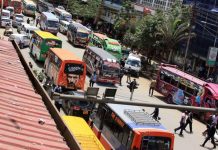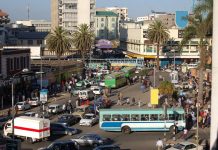The allegation that the government has mortgaged the Mombasa port for loans taken to build the standard gauge railway (SGR) has been circulating for a while. This was likely reinforced by the news that China Merchants Group took over Sri Lanka’s Hambantota port with a 99-year lease after Sri Lanka’s government, which had borrowed heavily from China to build this port, could no longer service this debt. There has also generally been more attention to how China lends in sub Saharan Africa (and other emerging economies) alongside with concerns raised over a ‘debt trap’.
More recently, a curious document circulated on social media: scans of a ‘management letter’ from the office of Kenya’s Auditor General that also warned of the risk that China would be entitled to take over Mombasa Port if Kenya defaulted on its SGR debt repayments. The nature of this document is still a bit unclear (and not just because of the typos in it). Reuters’ Maggie Fick contacted the AG’s office who said they had not issued it.
In 2017, blogger Bankelele excerpted some points from a Public Investments Committee (PIC) special report on the SGR financing. This was to include loan insurance with Sinosure as well as funds from the Railway Development Fund. It was also to include a commitment to minimum cargo loads through an agreement with the ports authority. All this sounds sensible and quite straightforward. But since this report predated the contract that was signed with China, we do not know whether it became part of the contract.
Privatising the port had been a plan for many years, but has always been politically very sensitive and Chinese firms are not the only ones interested in the port.
I joined several other people in asking a GOK official on Twitter for confirmation of the details in the PIC report. All good questions, he said, but ‘we’ll just have to wait for the audit report’. And that’s nonsense. Of course we don’t: an audit would be useful to tell us if the billions of dollars borrowed for the SGR were deployed as planned. But it does not require an audit at all to state the loan contract conditions. Why should it?
China’s government has now issued a formal statement that the port is not collateral. But I am at a loss why the Kenyan government is obfuscating so much on what is a clear-cut issue, and one that causes considerable aggravation in the tax-paying public. While I do not actually think that the port is collateral for the SGR, it is that obfuscation that really is a red flag.
SOURCE: the-star.co.ke








![Top 20 Used Cars to Avoid Buying in Kenya – [PHOTOS]](../../../blog/wp-content/uploads/2013/11/top-used-unreliable-cars-to-avoid2-80x60.jpg)

![Top 20 Used Cars to Avoid Buying in Kenya – [PHOTOS]](../../../blog/wp-content/uploads/2013/11/top-used-unreliable-cars-to-avoid2-100x70.jpg)





